10 SIMPLE WAYS TO INCREASE TESTOSTERONE LEVELS NATURALLY
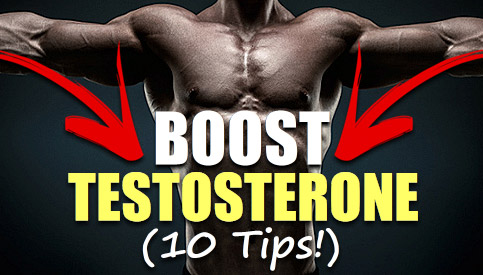
Gas prices go up, testosterone levels go down.
There’s no correlation, but it’s a trend that just keeps on going.
In fact, researchers have found that the testosterone levels of the average American man have dropped by 17% over the last twenty years. (1).
We’re not just talking about guys in the 40-50+ age range either…
This gradual decline in testosterone is affecting men as young as 22, with roughly one out of every four men recording test levels below the optimal range.
Sound a bit alarming?
It should, because low testosterone levels are responsible for a wide variety of negative physical and mental effects, including but not limited to…
- Decreased muscle growth and strength gains.
- Slower recovery in between workouts.
- Increased body fat, particularly around the midsection.
- Lowered sex drive and erection quality.
- Lack of motivation and desire for success.
- Fatigue and brain fog.
- Reduced athletic performance.
- Depression and mood swings.
- Lowered self confidence.
- Poorer blood circulation and cardiovascular health.
- Deceased bone strength and density.
- Greater risk of prostate cancer.
If you’ve been clearly experiencing a combination of the above symptoms, it’s possible that you’re suffering from low T.
In today’s post, I’ll be sharing 10 research-based ways to increase testosterone levels naturally and ensure that you’re staying within the ideal range for optimal health, muscle growth, fat loss and overall performance.
(Note: If your testosterone levels are already within the normal healthy range, applying these tips can certainly improve your energy levels, libido and mental well-being, but likely won’t have a noticeable impact on improving actual lean muscle growth. In order to measurably impact hypertrophy, test levels need to be increased by a very significant amount that likely can’t be attained naturally. However, if your testosterone levels are in fact below the normal healthy range currently, then these tips definitely can help out in the muscle building department as well.)
10 Tips To Increase Testosterone Levels Naturally
#1 – Weight Train And Exercise Regularly

To put it simply, people who exercise regularly have higher testosterone levels.
And according to research from Spain, strength training is one of the absolute best things you can do to get the highest testosterone spike possible. (2)
In the study, a group of 20 male university students took part in a strength training program 3 times per week.
After 4 weeks, the testosterone levels of the men increased by an average of 40% while resting cortisol levels decreased by 24%.
What’s more, another study found that strength training also up-regulates your body’s androgen receptors. So, your free testosterone (the testosterone that is not bound to albumin and thereby available for your receptors) will be more efficiently used. (3)
To maximize the testosterone-increasing effects of your weight training plan, make sure to center your workouts around big, basic compound exercises that train multiple muscle groups at the same time, using moderate to high intensity and without the use of excessively long rest periods.
Bottom line: if you’re currently living a relatively sedentary lifestyle, getting into the gym at least 3 days per week with a bit of extra cardio thrown into the mix is one of the fastest and most effective ways to increase testosterone levels naturally.
#2 – Don’t Overtrain Yourself

Just because some weight training is good doesn’t mean that more is automatically better.
While hitting the weights consistently is a simple and proven way to boost testosterone, overdoing it can actually have the opposite effect.
This is especially true if you’re already living a fairly stressful lifestyle outside of the gym or perform other physically demanding activities throughout the week.
According to a study from France on international rugby players, overtraining drops testosterone in an almost dose-dependent manner. (4)
The men in the study who were in an overtrained state experienced a 20-30% drop in testosterone levels, while the athlete who was in the most severely overtrained state had his test levels cut in half.
You don’t need to be in the gym for hours on end 5-6 days per week to make optimal muscle building progress in the first place, and it’s important that you regulate your overall training volume and frequency to make sure you aren’t doing too much.
Training tolerance is a fairly individual thing and depends on a variety of factors, and you can check out my previous post “10 Signs And Symptoms Of Overtraining” for more information.
#3 – Lower Your Body Fat (But Not Too Low)
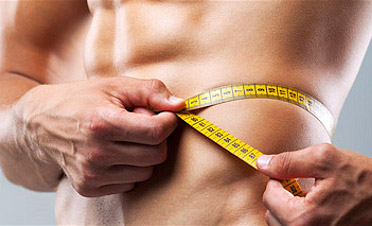
Excessively high body fat is associated with increased estrogen levels and lower testosterone, and if your current percentage falls much beyond the high teens, dropping some of that excess fat will be a simple and reliable way to increase testosterone levels.
This is only true up to a point though, as going too low can begin to work against you.
Trying to stay “shredded” year round with ripped abs and striated shoulders might sound great, but the reality is that it’s not a healthy state for the human body and will have a direct negative impact on your testosterone levels as well.
Anyone who has dieted down to low levels of body fat (myself included) knows the almost startling effect it can have on reducing libido, energy and motivation, all of which clearly bounce back once body fat levels are increased through a higher calorie intake.
So, if your goal is to maintain a decently lean and “aesthetic” physique but to also keep testosterone levels optimized, 10-15% body fat is a good year round figure for most men to shoot for.
10% is what I’d consider as the absolute minimum though, and to be fully on the safe side, closer to 12% would probably be ideal if you want to be certain that your test levels are at their peak.
#4 – Consume Adequate Dietary Fat
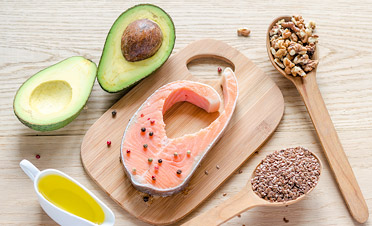
There is an almost direct relationship between saturated and monounsaturated fat intake and testosterone levels in men. (5)
Dietary fat decreases the levels of sex hormone binding globulin (SHBG), and one of the worst things you can do if you want to boost testosterone levels and remain in the healthy range is to eat a “low fat diet”. (6)
Keep in mind that dietary fat does not make you fat, and consuming sufficient fat each day is not only critical for keeping testosterone at the proper level but also for maintaining proper overall health as well.
For that reason, I’d suggest getting around 25% of your total daily calorie intake in the form of fat.
Fats contain 9 calories per gram, so simply take your calorie intake and multiply it by 0.25, and then divide by 9 to get the number of grams of fat to eat.
Going higher than this is also fine depending on your specific macro breakdown, but I wouldn’t recommend dropping below 20% as a minimum.
#5 – Get Enough Restful Sleep

Sleep is one of the greatest predictors of your morning testosterone levels. (7)
When researchers from Singapore measured the effect of sleep deprivation on 531 Asian men between 29 and 72 years old, they found that those who slept 4 hours per night had on average 60% less testosterone than the men who slept 8 hours. (8)
The highest amount of your body’s testosterone is produced during the night, and this is why “morning wood” is often used as an indicator of healthy T-levels.
Here are a few important tips to get the deepest and most restful sleep possible in order to increase testosterone levels…
- Maintain a consistent schedule by going to sleep and waking up at the same time each day.
- Avoid doing work or other “mind stimulating” activities in bed. Reserve your bed for sleep and sex only.
- Cut off all electronics, such as television, smartphones and laptops 30-60 minutes before bed.
- Avoid going to sleep too full or too hungry. Consume a medium sized meal within a few hours of nodding off to improve melatonin production and overall comfort.
- Keep your room cool (between 60-67 degrees), as dark as possible, and eliminate sudden background noises by sleeping in total silence or using white noise.
- Do not consume caffeine and other stimulants within 6-8 hours of sleep.
#6 – Lower Your Levels Of Daily Stress

Stress is a killer. Not just metaphorically, but in the very real literal sense.
Besides elevating cortisol levels and robbing you of your valuable testosterone, chronic stress also encourages the development of a wide variety of diseases. (9)
Bottom line?
To keep your overall health and hormone levels properly balanced, do the best you can to reduce your levels of repetitive daily stress.
This can often be tough given the busy lives and constant pressure that modern society places on us, but here are a few simple tips you can apply:
- Eat a minimally processed, whole food based diet.
- Exercise regularly.
- Reduce your levels of work-related stress as much as possible.
- Spend quality time with friends and family.
- Get a proper sleep each night.
- Increase your sexual activity.
- Take up hobbies you enjoy.
- Make time to fully unwind and relax.
- Get outside into nature.
- Laugh more.
- Try meditating.
#7 – Consume Enough Zinc
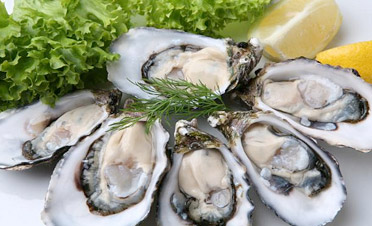
About one-third of the American population doesn’t consume the recommended RDA of zinc.
This is a problem, because when you’re zinc deficient, your estrogen levels increase and testosterone drops. (10)
One way that zinc deficiency causes your testosterone to plummet is by increasing the aromatase enzyme, which turns testosterone into the “female hormone” estrogen. (11)
This is especially important to pay attention to if you’re a hard training athlete, since zinc is depleted from the body through sweating.
Foods that are rich in zinc include oysters, red meat, wheat germ, shrimp, spinach, cashews, beans and mushrooms.
Another option to ensure that you’re consuming enough zinc each day is to take it in supplemental form.
20-30mg of zinc taken with a meal once per day is a reliable dosage to bring your levels of this mineral back into balance and offset any potential testosterone decreasing effects it may be causing. (If you don’t sweat a lot then go with a lower dose of 10-15mg to be on the safe side)
#8 – Consume Enough Magnesium

Magnesium is another important testosterone boosting mineral to pay attention to, and just like zinc, it’s also lost through sweat.
Good sources of dietary magnesium include spinach, nuts/seeds, beans, whole grains, avocados, fish, bananas and figs.
Supplementation is an option here as well at 200-400mg of magnesium taken alongside a meal in the form of either magnesium gluconate, magnesium citrate or magnesium diglycinate.
Magnesium supplementation also has the added benefit of improving sleep quality in those with lower-than-normal levels.
#9 – Moderate Your Alcohol Intake
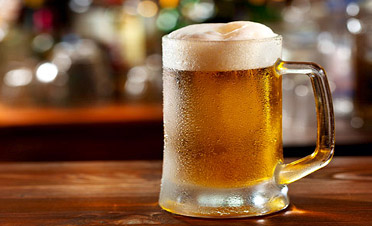
Alcohol itself is not some inherently evil substance that you have to completely abstain from, but there is plenty of evidence to show that heavy alcohol consumption reduces testosterone. (12, 13, 14)
Some alcoholic drinks mimic the effects of estrogen in the body. This is particularly the case for beer, which, due to the added hops, contains a high amount phytoestrogens.
One study also found that chronically high alcohol consumption can convert your testosterone into the female sex hormone estrogen. (15)
Alcohol also increases cortisol levels, which can take a full day to return back to normal. (16)
How much is too much?
It might come as a relief that the effects of a few drinks are negligible. In fact, some researchers have even found that small amounts of alcohol can slightly increase testosterone. (17)
However, after around one-and-a-half to two alcoholic drinks, the effects reverse, and testosterone decreases in a dose-dependent manner.
Drinking more heavily once in a while likely won’t be an issue as long as it’s being done relatively infrequently, but if you want to increase testosterone levels to the highest degree, keep the amount and frequency under control.
#10 – Get Out In The Sun

Vitamin D is involved in more than a hundred bodily functions. But due to our indoor lifestyles, 48% percent of Americans are deficient in the “sunshine vitamin”. (18)
Such deficiency can have significant consequences in men, because there is a close correlation between serum Vitamin D and androgen levels. (19)
The lower your vitamin D levels are beneath the normal healthy range, the lower your testosterone.
Fortunately, it also works the other way around. One study looked at the effects of daily vitamin D supplementation on testosterone levels in a group of 200 overweight men. Half of the subjects received 3332-IU vitamin D. The other group received a placebo.
The results? After one year, the supplementation group had on average 25% higher testosterone levels. (20)
The preferred way to get enough vitamin D is by exposing yourself to 30 minutes of sunshine daily. But since this is not possible for most people (especially in the winter) supplementing with vitamin D3 is a good alternative.
Technically speaking, you would need to get blood work done in order to determine exactly how much Vitamin D you should be supplementing with. However, 2000-3000 IU daily is a good reliable guideline for most people.
Boosting Testosterone Levels Naturally: The Bottom Line

Never throughout history have men had lower testosterone levels than today.
This can have significant consequences ranging from fat gain and muscle loss to decreased sexual performance and a higher risk of various diseases.
So, if you suffer from “low-T”, or just want to improve your overall health, performance, and well-being, use the 10 proven tips outlined above to increase testosterone levels naturally and stay within the optimal healthy range.
If you found this article helpful, make sure to sign up for your FREE custom fitness plan below...




